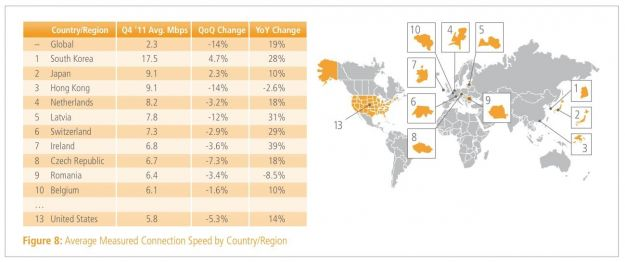For nearly three decades I have worried about the connection speed to a remote network. Sure in the early days it was a 300baud modem hooked into a mainframe, but even then connectivity mattered. As the dial-up era matured we tried to squeeze every little bit of speed from those connections, and that effort continues into the DSL, Cable and LTE era.
But ultimately all of these techniques are limited by infrastructure and bandwidth availability. For example, my local cable provider offers a speed boost solution at a monthly fee, but I already find that my overall speed can vary from ~1MBps to >10MBps on a daily basis!
How does the rest of the world compare? According to a recent Digital Trends
survey they apparently do pretty well – South Korea averages more than 17.5Mbps, Japan and Hong Kong deliver 9.1Mbps, and a wide array of countries in Europe provide service between 6 and 8Mbps. As for the US in general – we rank 13th with an average rate of ~5.8Mbps. Given the amount of low-coverage territory throughout the middle part of the country … that tells me that some people have some screaming fast internet service!
From the study:
For the last four years, the content-distribution service Akamai has been publishing its State of the Internet report, which reads like a list of the haves and have-nots in the Internet world. The report details countries, regions, and cities that seem to have to the most impressive broadband capabilities — and, conversely, which seem to offer the least-capable connections to the global Internet.
So who wins? South Korea, with both the highest average connection bandwidth to Internet users (17.5 Mbps) as well as the highest average peak bandwidth delivered to users — a whopping 47.9 Mbps. At those speeds, a typical movie can be downloaded in its entirety in high-definition in just over 30 minutes. A typical song download? Less than three and a half seconds.
Who are the losers? Countries like Cuba, the Solomon Islands, the Comoros, East Timor, Eritrea, Chad, Niger, Mali, Guinea, Sierra Leone, Burundi, the Central African Republic, the Republic of the Congo, and Democratic Republic of the Congo (formerly Zaire), all of whom measured as having average connection speeds under 300kbps. That same high definition movie would take more than 30 hours to download at 300kbps.
The United States? Akamai puts the U.S. at thirteenth in the world, with an average connection speed of 5.8 Mbps. That same HD movie would take over an hour and a half to download — meaning — on average and all things being equal (which they never are) — Americans with broadband have just barely enough bandwidth to stream a single high-definition movie in real-time, if they don’t do much else on their Internet connection at the same time.
What about you? How does YOUR internet service compare?
Source: Digital Trends
